Top Programming Languages for Software Engineers in 2025
As technology continues to evolve rapidly, the demand for software engineers with expertise in the right programming languages remains higher than ever. Whether you’re building scalable web apps, developing AI models, or working in embedded systems, your choice of programming language can significantly influence project success. In 2025, certain languages are standing out due to their versatility, performance, and thriving ecosystems.
In this blog, we’ll explore the top programming languages software engineers should master in 2025 and why they’re worth your attention.
1. Python
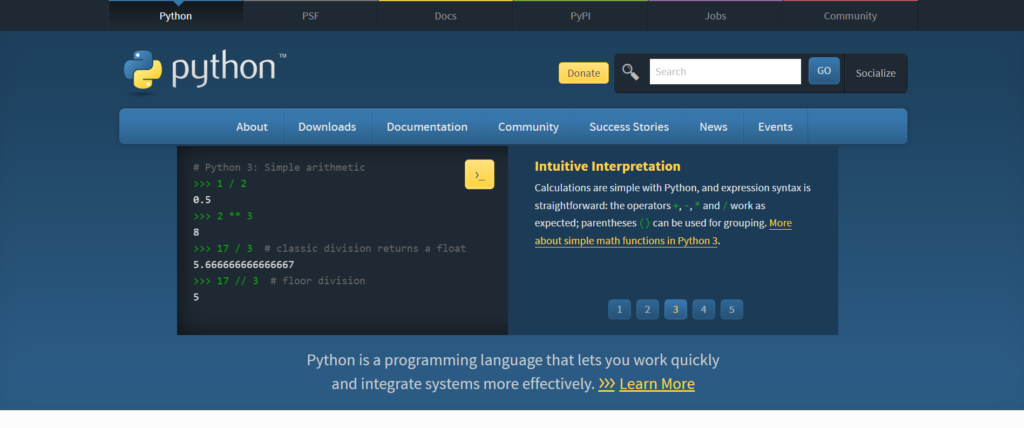
Why It’s Still a Leader: Python has consistently topped popularity charts, and in 2025, it remains a go-to language for AI, machine learning, data science, and web development. Its simple syntax and vast library ecosystem make it an ideal choice for both beginners and professionals.
Key Use Cases:
- Artificial Intelligence and Machine Learning
- Data Analysis and Visualization
- Web Development (Django, Flask)
- Automation and Scripting
Strengths:
- Easy to read and write
- Extensive libraries and frameworks
- Strong community support
2. JavaScript
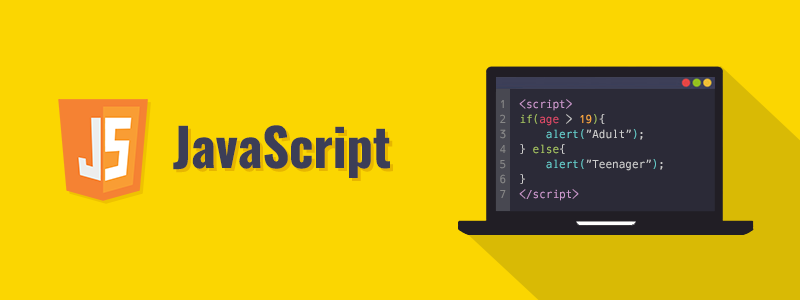
Why It Matters in 2025: JavaScript continues to dominate front-end development and is increasingly used in full-stack applications thanks to Node.js. With the rise of frameworks like React, Vue, and Svelte, JavaScript is critical for building dynamic, responsive web applications.
Key Use Cases:
- Web Development (React, Angular, Vue)
- Backend Development (Node.js)
- Mobile App Development (React Native)
Strengths:
- Runs on any modern browser
- Vast ecosystem of frameworks
- Versatile for full-stack projects
3. TypeScript
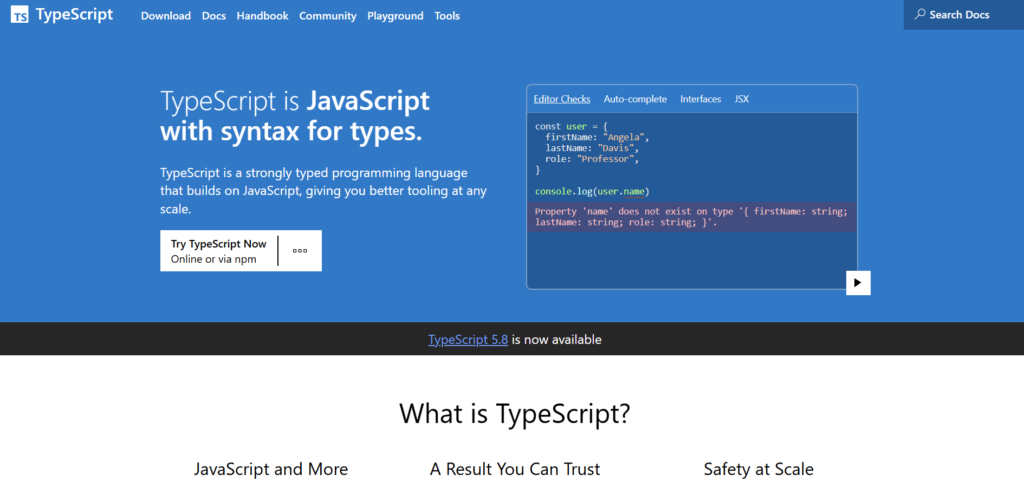
Why It’s Growing: TypeScript is a statically typed superset of JavaScript that improves code quality and maintainability. Its use is rapidly expanding in large-scale applications and enterprise-level projects, especially in teams looking to reduce bugs and improve developer experience.
Key Use Cases:
- Large-scale web applications
- Front-end development
- Enterprise projects
Strengths:
- Better tooling and debugging
- Backward compatibility with JavaScript
- Strong typing reduces runtime errors
4. Java
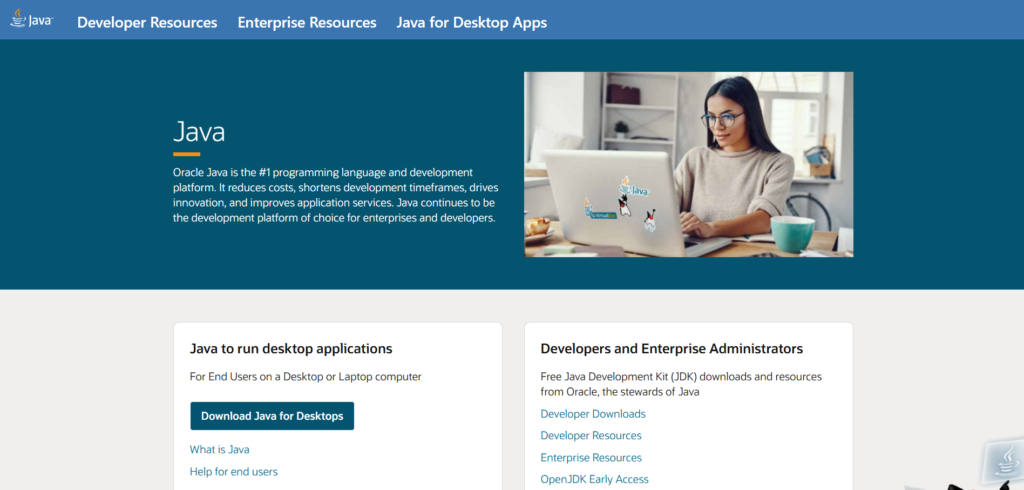
Why It Endures: Despite being over two decades old, Java continues to be a solid choice for enterprise-level applications, Android development, and large-scale systems. Its platform independence and strong ecosystem keep it relevant in 2025.
Key Use Cases:
- Android App Development
- Enterprise Applications
- Financial Systems
Strengths:
- Cross-platform compatibility
- Strong memory management
- Massive community and job market
5. Go (Golang)
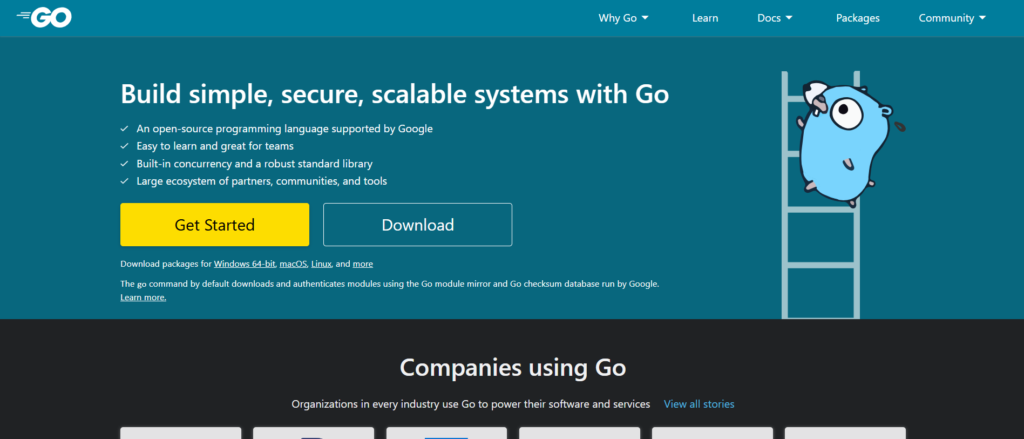
Why It’s Trending: Go, developed by Google, is gaining traction for cloud-native applications, distributed systems, and microservices. Its simplicity, fast performance, and built-in concurrency make it ideal for high-performance backend development.
Key Use Cases:
- Cloud computing
- DevOps tools (e.g., Docker, Kubernetes)
- Backend systems
Strengths:
- Compiles to machine code
- Fast and efficient concurrency
- Simple and readable syntax
6. Rust
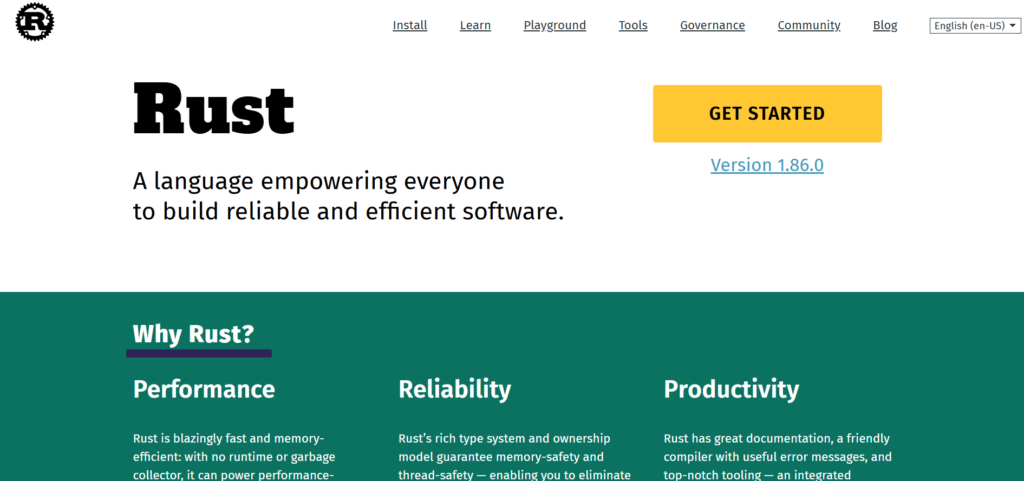
Why Developers Love It: Rust is praised for its performance, memory safety, and zero-cost abstractions. It’s ideal for system-level programming and is increasingly adopted in blockchain and embedded systems.
Key Use Cases:
- Systems programming
- Blockchain development
- Embedded software
Strengths:
- Memory safety without garbage collection
- High performance
- Strong developer community
7. Kotlin
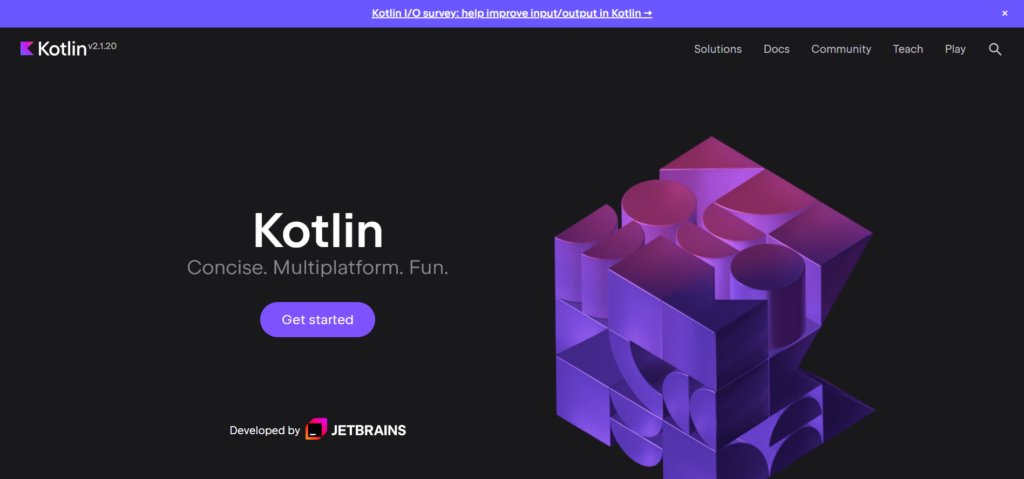
Why It’s Gaining Popularity: Kotlin has become the preferred language for Android development. It offers cleaner syntax, better safety features, and full interoperability with Java, making it a modern alternative in mobile and backend development.
Key Use Cases:
- Android app development
- Server-side development
- Cross-platform mobile apps (Kotlin Multiplatform)
Strengths:
- Interoperable with Java
- Concise and expressive
- Endorsed by Google for Android
8. Swift
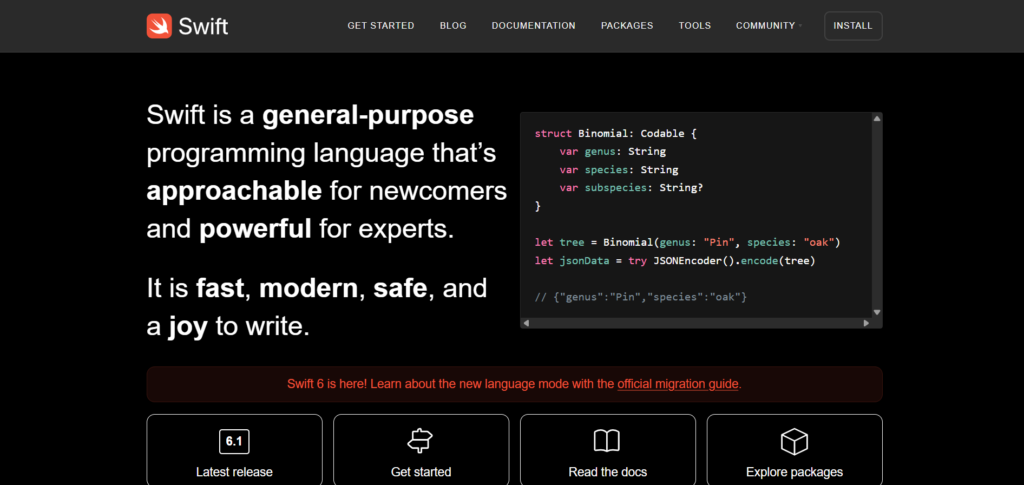
Why It’s Essential for Apple Ecosystem: Swift is the standard for iOS, macOS, and watchOS development. With Apple’s dominance in mobile markets and its push toward more AI-integrated apps, Swift is a great choice for those in the Apple ecosystem.
Key Use Cases:
- iOS and macOS development
- Wearable app development
- Cross-platform Apple apps
Strengths:
- Fast and modern syntax
- Safe and efficient
- Strong support from Apple
9. SQL
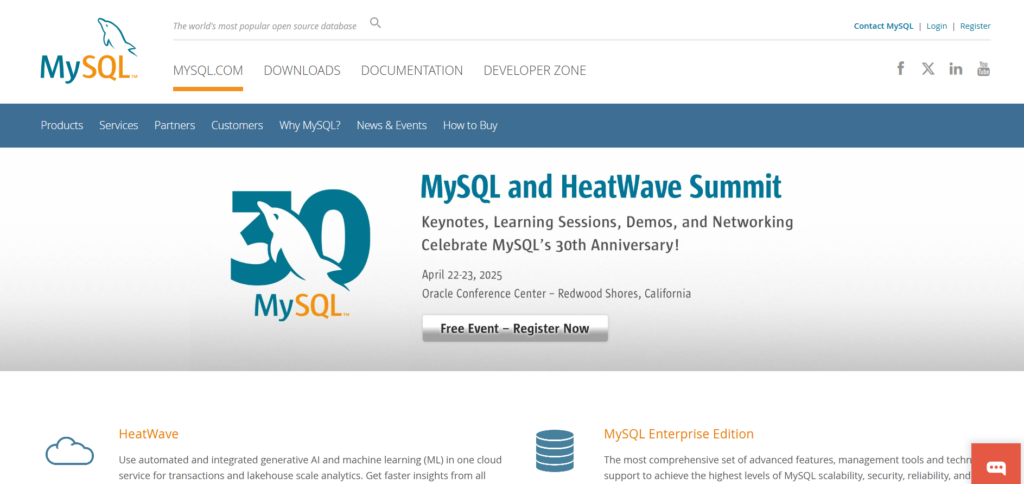
Why It’s Always Needed: Even in 2025, SQL remains indispensable for managing and querying relational databases. Whether you’re working in analytics, web apps, or enterprise software, knowing SQL is often non-negotiable.
Key Use Cases:
- Data analysis and reporting
- Backend database integration
- Business intelligence tools
Strengths:
- Universal database language
- High demand in data-related roles
- Essential for interacting with relational databases
10. C#
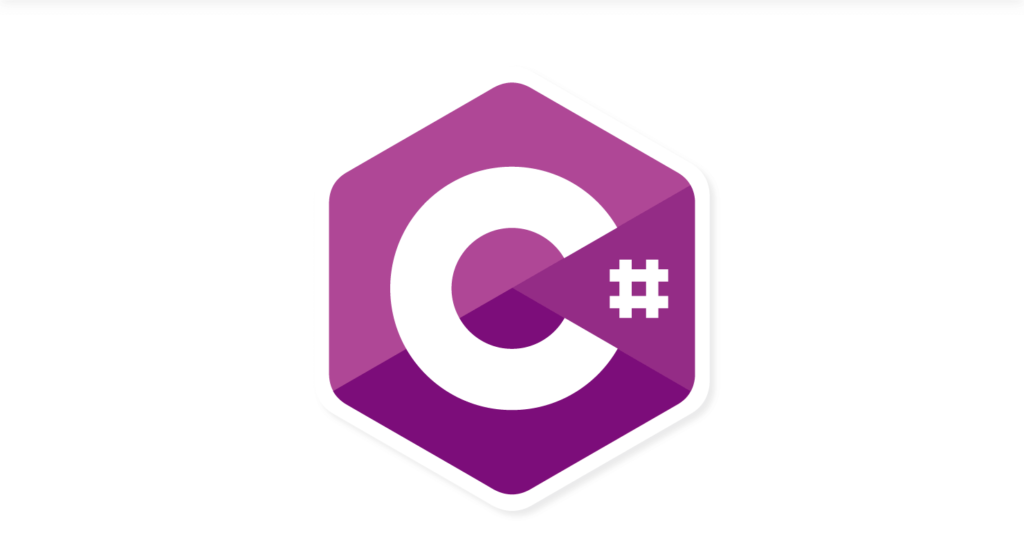
Why It’s Still Strong: Backed by Microsoft, C# remains crucial in enterprise environments, game development (especially with Unity), and cross-platform development using .NET MAUI.
Key Use Cases:
- Windows desktop applications
- Game development with Unity
- Web applications with ASP.NET
Strengths:
- Powerful tooling with Visual Studio
- Object-oriented and modern
- Versatile across multiple domains
Honorable Mentions
- Dart: Powering Flutter for cross-platform app development.
- R: Still popular among statisticians and data scientists.
- Shell/Bash: Vital for DevOps and system administration.
- Julia: Rising in scientific computing and numerical analysis.
Choosing the Right Language
Your choice of programming language should align with your career goals, project requirements, and interests. While some roles demand expertise in one language, others value versatility across several. Consider your focus area:
- Web developers should master JavaScript, TypeScript, and Python.
- Mobile developers should look into Kotlin, Swift, and Dart.
- AI/Data Science enthusiasts should focus on Python, R, and Julia.
- System-level programmers may benefit from Rust, Go, and C++.
Learning the fundamentals of software engineering and understanding core programming principles is more important than mastering every language. Still, staying current with industry trends gives you a strong competitive edge.
Read More: Top 5 Cybersecurity Certifications for IT Professionals
FAQs
1. What programming language should I learn first in 2025?
Python – It’s beginner-friendly and widely used across multiple domains.
2. Is Java still worth learning in 2025?
Yes – Java is still heavily used in enterprise systems and Android development.
3. Which language is best for web development?
JavaScript (with TypeScript) is essential for front-end and full-stack development.
4. What language is best for system-level programming?
Rust – It offers memory safety and performance without garbage collection.
5. Is Go better than Python for backend development?
For high-performance and concurrency-heavy systems, Go is often preferred.




